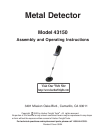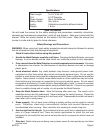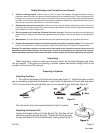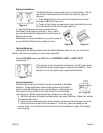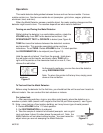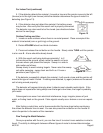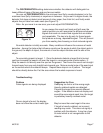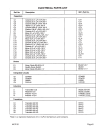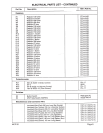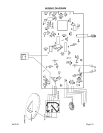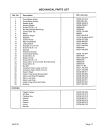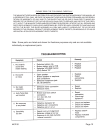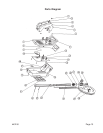
#43150 Page 7
The DISCRIMINATION setting determines whether the detector will distinguish be-
tween different types of ferrous and non-ferrous metals.
You can set DISCRIMINATION to the minimum level (fully counterclockwise) or to the
maximum level (fully clockwise) or anywhere in between. As you set it to higher levels, the
detector first does not detect small pieces of silver paper, then thick foil, and finally metal
objects like pull tabs from soda cans (see Figure 15).
Note: As you move to a new area, you must adjust DISCRIMINATION.
As you sweep the search coil back and forth over the
ground surface you will recognize the difference between
signals that occur at random and signals that are stable
and repeatable. The key is to dig only for those targets
that produce a strong, repeatable signal. This will prevent
you from wasting time focusing on trash induced signals.
No metal detector is totally accurate. Many conditions influence the success of metal
detection. Among the factors that influence results are the angle at which the object rests in
the ground, the depth of object, the amount of iron the object contains and the size of the
object.
To accurately pinpoint a target: 1. Once the detector detects a target that is buried,
continue to sweep the search coil over the target in a narrowing side-to-side motion. 2.
Stop the search coil directly over the spot on the ground. Then move the search coil straight
forward away from you and straight back towards you. Make a mental note of the exact spot
on the surface where the detector beeps. Repeat these steps in an X pattern. The target
should be directly below the X at the area where the loudest response is heard.
Troubleshooting:
Problem Suggestion for Cure
False signals are being displayed Sweeping too fast or at the wrong angle.
Heavily oxidized metals are detected.
Pinpoint the target from several different
angles. If the detector does not display and
sound the same signal each time, the target
is probabley heavily oxidized metal.
Once a target is found, the display
does not show the correct metal type May be more than one target in the area.
If target is heavily oxidized, an incorrect
reading may occur. This does not signify a
problem with the detector. It may be a type
of metal which is not recognizable to the
detector.
Figure 15



